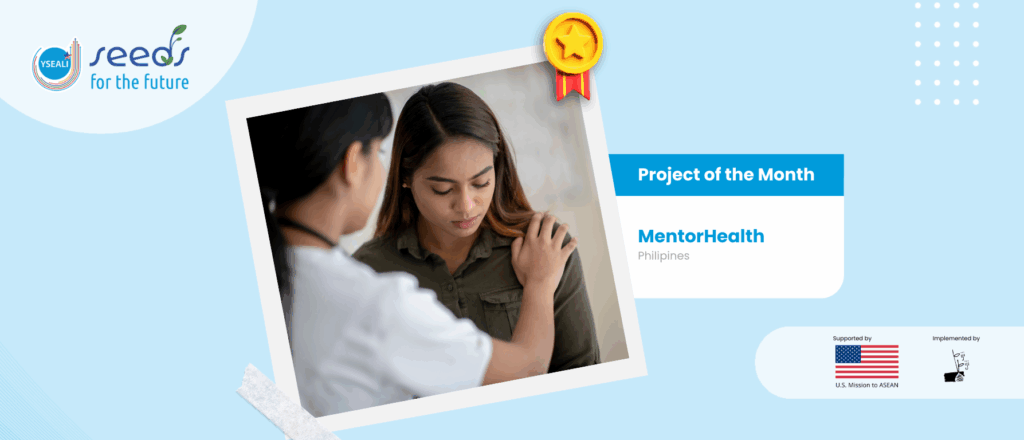About the Project
We created MentorHealth to strengthen mental health support in Philippine public high schools. Our focus is to train 30 teachers and 60 students with practical skills to respond early to concerns and guide peers toward proper care.
By linking schools with local service providers, we are building a clear referral system that makes professional help more accessible. This process embeds support structures directly into schools, so students know where to turn and teachers are equipped to respond as part of a lasting framework.
Why do you care about this specific topic/issue?
All of us grew up in public schools that often overlooked mental health. Few of us had access to counselors during difficult times.
As alumni of the 2024 YSEALI Academic Fellowship, we were exposed to how schools abroad integrate mental health into daily routines, from classroom discussions to structured referral systems. Seeing what was possible gave us a perspective we never had as students.
That experience transformed our personal challenges into a shared mission to build the support system we once needed and make it a standard part of education.
Why did you decide to start this project?
The idea for MentorHealth matured after our fellowship experience, when we saw that our initial action plan could grow into a practical program. In the Philippines, schools often lack clear pathways for students to use existing mental health services, leaving many young people without proper support.
We created MentorHealth to bridge this gap by building direct links between schools and local government units. Through structured training, we prepare teachers and students to guide their peers and connect them to the care they need.
What are your goals for this project?
Our goal is to establish a school-based framework that delivers practical and lasting mental health support. We will train 30 teachers to identify concerns early and make informed referrals, while preparing 60 students to serve as peer ambassadors who promote help-seeking behavior.
To anchor these efforts, we will convene a Technical Working Group that will formalize referral pathways between schools and local government units. By the conclusion of the project, our partner schools will have an operational system in place and a strengthened culture where mental health care is integrated, accessible, and sustained over time.
How will YSEALI Seeds help you achieve your goals?
YSEALI Seeds provides the foundation that allows MentorHealth to grow beyond an idea into a working system. The program offers more than funding. Monthly mentorship sessions help us sharpen our strategies, track progress, and stay aligned with our long-term vision.
Just as important, the network connects us with Seeds alumni whose projects have become lasting institutions. Learning from their experiences allows us to adapt proven models and apply expert insights. With this support, we can ensure that our pilot schools build systems that are both effective and replicable nationwide.
What have you accomplished and implemented so far?
We have made strong progress in preparing MentorHealth for implementation. Both partner schools have confirmed their full commitment, and training schedules for teachers and students are already in place.
Two of the six training modules have been developed and are under review by a registered psychometrician to ensure quality. We have also completed the training materials for the first sessions in Antique Province and are finalizing preparations with local partners. These steps position us to move confidently from training into policy development and referral system implementation.
What are the most significant lessons learned you’ve experienced so far?
One of the most important lessons we have learned is the value of engaging stakeholders early and consistently. Working with school leaders, teachers, and local government units from the start has helped us build trust and foster shared ownership of the project.
We have also learned to approach bureaucratic processes with patience and to document each step carefully so other schools can replicate the model. Above all, we recognize that mental health support can only succeed when schools, families, and local governance work together.
What are the success stories you can share with others?
Even in the early stages, MentorHealth has seen promising results. Our rural and urban pilot schools, which serve very different student populations, have already begun sharing ideas and strategies for supporting student well-being. This collaboration shows their readiness to work together even before formal training begins.
Another success is the rapid formation of a volunteer network, including a registered psychometrician whose expertise ensures that our training materials meet professional standards. These early partnerships demonstrate that with a clear mission, strong collaboration can take root quickly and provide a foundation for lasting improvements.
